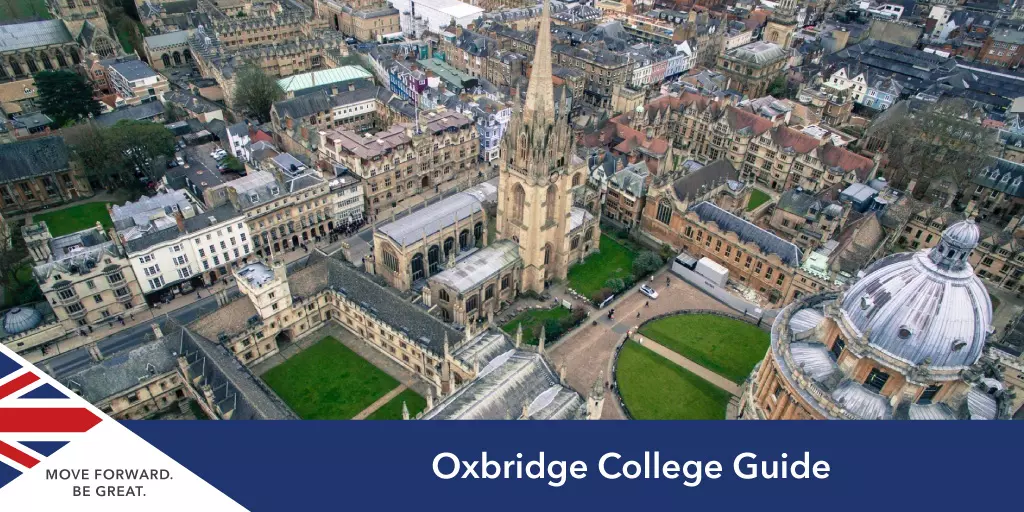It sometimes happens that a tourist in Oxford or Cambridge stops to ask someone where the actual university is. They can see plenty of impressive buildings that look like they must be something to do with the university, but where, they wonder, is the university itself? Where is the campus where the teaching takes place – the spiritual home of the institution, outside of which everything is peripheral?
The University of Oxford and the University of Cambridge are two of the few UK universities providing a college system. At these universities, colleges – independent and distinct organisations, albeit united like a patchwork quilt into an institutional whole – have emerged one by one over the centuries and joined the university. Learn more about the Oxbridge College system below. If you want to begin your application to study at an Oxbridge University, arrange a free consultation with SI-UK today.

Oxbridge Colleges Guide for International Students
Famous Oxbridge Colleges
University College Oxford, which claims to be Oxford’s oldest college, was endowed in 1249 and was (legendarily) founded in 872; its architecture is commensurately traditional. Lady Margaret Hall College, Oxford, was founded in 1878 as a ladies’ college, but it was not until 1920 that the university agreed to give academic degrees to women students. Harris Manchester College, as the name suggests, was in Manchester in the late eighteenth century but later moved to Oxford, becoming a permanent private hall in 1990 and finally a complete constituent college of the university with the grant of a royal charter in 1996.
King’s College Cambridge – one of the finest examples of late English gothic architecture – was founded in 1441 by King Henry VI, with members initially to be recruited exclusively from Eton. St Catherine's College Oxford, set up in 1868 as a one-room delegacy for poorer citizens to study at Oxford without the cost of college membership, later expanded to a building in the high street complete with a library and lecture hall, and finally became an entire college in 1962, being now a monument of modern-day architecture. Christ Church, Oxford, which has a tower designed by Sir Christopher Wren and boasts thirteen prime ministers and two kings among its alums, is of a very different provenance architecturally, historically, culturally, and socially. Its sister college in Cambridge, Trinity College, is one of the country’s largest landowners and has an endowment of £1.87bn.
Oxbridge College Quirks
Some colleges are prominent, and some are small. One college has over 700 undergraduates, while another has under 250. Some are more sporting and sociable; others are more cerebral and serious. One college may be better for physics, while another is better for law or politics. Some only recently admitted women, while others were founded for women and only recently admitted men. Some are more likely to accept privately-educated candidates, and some have more international students.
Which Oxbridge College Suits Me?
An applicant for Oxford or Cambridge should consider which college would suit them academically, aesthetically, recreationally, practically, and generally. Are you a rugby player who attended public school and liked going to parties, or are you a shy mathematical genius with a taste for fruit juice but not for architectural heritage or rowing? Horses for courses notwithstanding, colleges want to accommodate students of all preferences and demographic characteristics. Even so, it is worth searching for a natural habitat.
Oxbridge College Rules and Regulations
A student lives in an Oxbridge college, will probably (not compulsorily) eat, often takes tutorials, and will be subject to discipline in college. It is colleges that accept and reject and sometimes expel. However, a student will often take lectures outside the college, go to libraries outside the college, and make friends outside the college in the many recreational settings familiar to the colleges. Examinations that count towards degree results are set by the university, not by the colleges, and so a first in history from Corpus means the same as one from Merton. One graduate from the university: same scroll and same mortarboard.
Study at Oxbridge
If you want to begin your application to study at an Oxbridge College in Cambridge or Oxford, arrange a free consultation with SI-UK London today.




 My consultant was very helpful and motivating. She helped me every step of the way, even when the deadline was so close. I feel I could not have done it without her. I'd highly recommend this service to any and all of my many friends interested.
My consultant was very helpful and motivating. She helped me every step of the way, even when the deadline was so close. I feel I could not have done it without her. I'd highly recommend this service to any and all of my many friends interested. 









